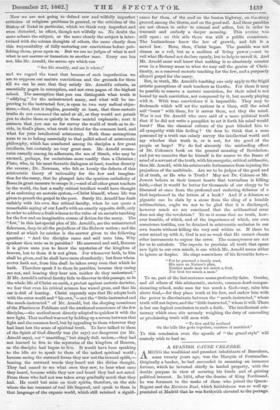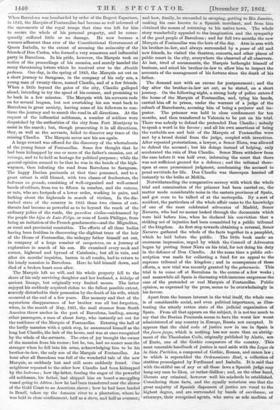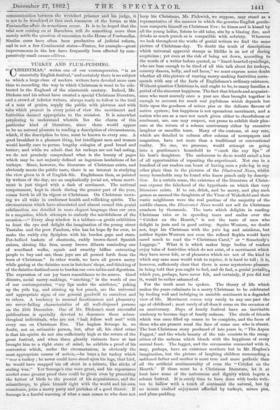A SPANISH CJUSE CELEBRE.
A HONG the wealthiest and proudest inhabitants of Barcelona, II. some twenty years ago, was the hlanquis of Fontanelles. Originally a banker, he had succeeded in amassing an immense fortune, which he invested chiefly in landed property, with the double purpose in view of securing his funds and of gaining political interest. In 1834, after the demise of King Ferdinand, he was foremost in the ranks of those who joined the Queen- Regent and the Estatuto Real, which faithfulness was so well ap- preciated at Madrid that he was forthwith elevated to the peerage.
When Barcelona was bombarded by order of the Regent Espartero, in 1843, the Marquis of Fontanelles had become so well informed of the movements of the royal troops that time was left for him to secure the whole of his personal property, and he conse- quently suffered little or no damage. He now became a warmer adherent than ever of the Constitutional Government of Queen Isabella, to the extent of arousing the animosity of the friends of Don Carlos, who formed a very numerous and influential party in Barcelona. In his pride, however, the Marquis took no notice of the proceedings of his enemies, and merely handed the many threatening letters which he received over to the Alcalde pedants. One day, in the spring of 1845, the Marquis set out on a short journey to Saragossa, in the company of his only son, a young man of twenty-three, named Claudio, and of a few friends. When a little beyond the gates of the city, Claudio galloped ahead, intending to try the speed of his courser, and promising to be back in a few minutes. The Marquis with his servants rode on for several leagues, but not overtaking his son went back to Barcelona in great anxiety, leaving some of his followers to con- tinue the journey and to search the road in all directions. At the request of the influential nobleman, a number of soldiers were despatched by the authorities of the city from Fort Montjouy to assist in the search ; but, though prosecuting it in all directions, they, as well as the servants, failed to discover any trace of the missing Claudio. The Marquis never saw his son again.
A large reward was offered for the discovery of the whereabouts of the young Senor of Fontanelles. Some few thought that he had been kidnapped by one or more of the father's enemies, out of revenge, and to be held as hostage for political purposes ; while the general opinion seemed to be that he was in the bands of the high- waymen, then infesting the road from Barcelona to Saragossa. The happy Iberian peninsula at that time possessed, and to a great extent is still blessed, with two classes of freebooters, the ladrones en grande, consisting of well-organized and well-armed bands of robbers, from ten to fifteen in number, and the rateros, or rats, who are footpads of a lower order, working in pairs, and lurking about the highroads in search of victims, In the dis- turbed state of the country in 1845 these two classes of cut- throats had become so powerful as to be beyond the reach of the ordinary police of the roads, the guardias civiles—nicknamed by the people the life: de Luis-Felipe, or sons of Louis Philippe, from being an imitation of the French gendarmerie—and the Mignelites, or rural and provincial constables. The efforts of all these bodies having been fruitless in discovering the slightest trace of the heir of the House of Fontanelles, the unhappy father himself set out, in company of a large number of escopeteros, on a journey of exploration in search of his son. He examined every nook and comer, highroad and byroad of Catalonia ; but all in vain, and after six months' inquiries, barren in all results, had to return to his lonely mansion in Barcelona. Here he laid himself down, and died of a broken heart soon after.
The Marquis left no will, and his whole property fell to the share of his only surviving daughter and her husband, a hides/go of ancient lineage, but originally very limited means. The latter enjoyed his suddenly acquired riches to the fullest possible extent, scarcely disturbed in their possession by the death of his wife, which occurred at the end of a few years. Her memory and that of the mysterious disappearance of her brother was all but forgotten,
when, in the month of 11 ay, 1861, the mail steamer from South America threw anchor in the port of Barcelona, landing, among other passengers, a man of about forty, who instantly set out for the residence of the Marquis of Fontanelles. Entering the hall of the lordly mansion with a quick step, he announced himself as the long lost Claudio, the heir of the house, and was at once recognized by the whole of the servants. The cries of joy brought the owner of the mansion from his rooms ; but he, too, had no sooner seen the stranger when he fell into his arms, acknowledging him to be his brother-in-law, the only son of the Marquis of Fontanelles. An hour after all Barcelona was full of the wonderful tale of the new Marquis, so suddenly lost and still more suddenly found. One neighbour repeated to the other how Claudio had been kidnapped by the ladrones ; how the latter, fearing the anger of the powerful old nobleman, his fathei, had shipped him on board a smuggling need going to Africa ; how he had been transferred near the shores of the Gold Coast to an American slaver ; how he had been landed in Brazil, taken up the Amazon river to a plantation, where he was held in dose confinement, half as a slave, and half as overseer; and how, finally, he succeeded in escaping, getting to Rio Janeiro, making his case known to a Spanish merchant, and from him obtained the means of returning to his native town. The whole story wonderfully appealed to the imagination and the sympathy of the good people of Barcelona ; and for full two months the new Marquis of Fontanelles was the hero of the day. Arm in arm with his brother-in-law, and always surrounded by a posse of old and new friends, he visited the theatres, concerts, and other places of public resort in the city, everywhere the observed of all observers. At last, tired of amusements, the Marquis bethought'himself of business, and asked his brother-in-law to allow him to inspect the accounts of the management of his fortune since the death of his father.
The demand met with an excuse for postponement ; and the day after the brother-in-law set out, as he stated, on a short journey. On the following night, a strong body of police entered the house of the Marquis of Fontanelles, and, tying his hands, carried him off to prison, under the warrant of a judge of the suburb of Barceloneta, accusing him of being a perjurer and im- postor. The prisoner was held in close confinement for ten months, and then transferred to Valencia to be put on his trial. There was nobody to defend the pretended Don Claudio ; nobody to speak a word in his favour ; and all his own assertions of being the veritable son and heir of the Marquis of Fontanelles were met by a broad denial from the judge, coupled with invectives. After repeated protestations, a lawyer, a Senor Niera, was allowed to defend the accused ; but his doings instead of helping, only accelerated the ruin of Don Clauclio. Senor Niera withdrew from the case before it was half over, informing the court that there was not sufficient ground for a defence ; and the tribunal there- upon at once pronounced judgment, condemning the accused to penal servitude for life. Don Claudio was thereupon hurried off instantly to the hulks at Melilla.
Notwithstanding the comparative secrecy with which the whole trial and examination of the prisoner had been carried on, the matter made considerable noise in the eastern provinces of Spain, and got even to be talked of at the metropolis. By a sort of accident, the particulars of the whole affair came to the knowledge of one of the most celebrated advocates of Madrid, Senor Navarro, who had no sooner looked through the documents which were laid before him, when he declared his conviction that a striking act of injustice had been committed by a public tribunal of the kingdom. As first step towards obtaining a reversal, Senor Navarro gathered the whole of the facts together in a pamphlet, which he laid before the public. The little book made an enormous impression, urged by which the Council of Advocates began by putting Senor Niera on his trial, for not doing his duty in the defence of Don Claudio. At the same time a public sub- scription was made for collecting a fund for an appeal to the supreme tribunal of the kingdom ; and in consequence of these efforts, a new trial was recently granted by the gobernacio. This trial is to come off at Barcelona in the course of a few weeks; and meanwhile all Spain is discussing with immense eargerness the case of the pretended or real Marquis of Fontanelles. Public opinion, as expressed by the press, seems to be overwhelmingly in his favour.
Apart from the human interest in the trial itself, the whole case is of considerable social, and even political importance, as illus- trating the utterly rotten state of the judicial organization of Spain. From all that appears on the subject, it is not too much to say that the Iberian Peninsula seems to have the worst law worst administered of any country in Europe, Russia not excepted. It appears that the chief code of justice now in use in Spain is the /sees juzgo, which is nothing less nor more than an abridg- ment of the Theodosian Code, originally published by .Alaric, son of Euric, one of the Gothic conquerors of the country. This most venerable handbook of justice is used aside with the Leyes de in Side Partidas, a compound of Gothic, Roman, and canon law ; to which is superadded the Ordenamiento Real, a collection of stattates promulgated by Ferdinand and Isabella. It is said that with the skilful use of any or all these laws a Spanish judge may hang any man he likes, or rather dislikes., and, on the other hand, liberate any criminal, however well his misdeeds be established. Considering these facts, and the equally notorious one that the great majority of Spanish dispensers of justice are venal to the highest degree, and are surrounded by bands of eseribanos, or attorneys, their recognized agents, who serve as sole medium of communication between the wretched prisoner and his judge, it is not to be wondered at that such romances of the forum as this Fontanellas affair do sometimes occur. It is to be hoped that the trial now coming on at Barcelona will do something more than merely settle the question of succession to the House of Fontanelles. Similar cases have often been productive of judicial reform, and in not a few Continental states—France, for example—great improvements in the law have frequently been effected by com- paratively small causes cellbres.
































 Previous page
Previous page